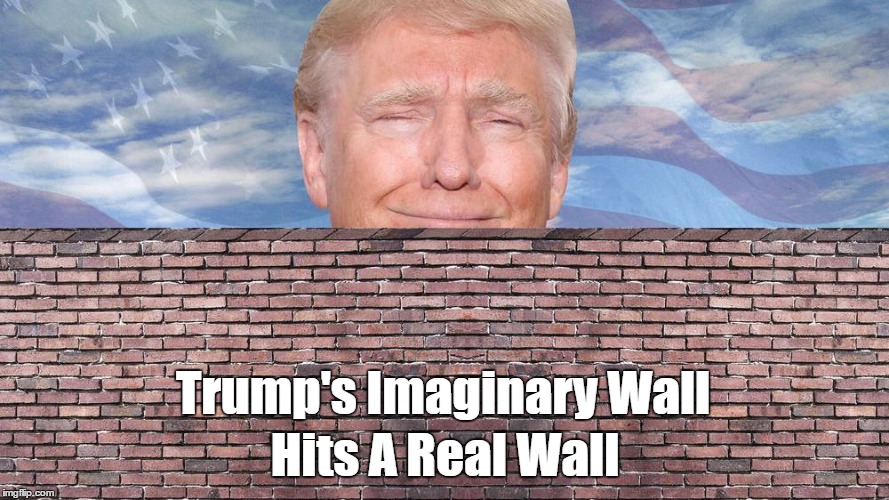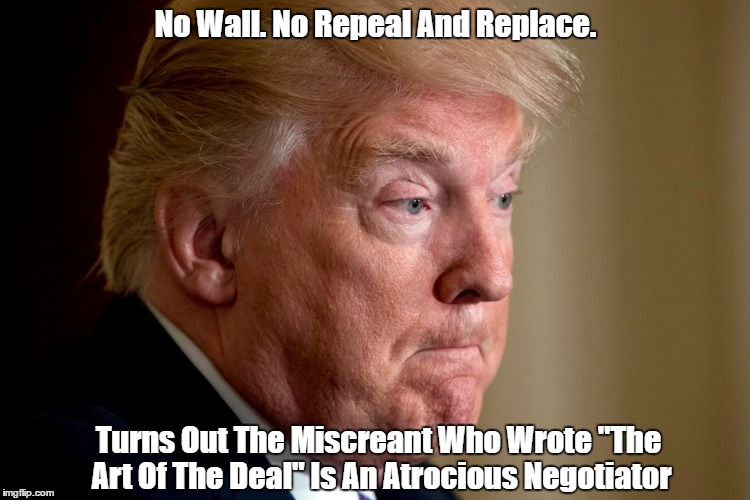
Abomicare: Trump's Titanic Failure
7 Years' Bitching About Obamacare While Continually Touting Their "Terrific, Low-Cost Replacement" And The GOP Produces Nothing But Flatulence, Excrement And Anguish For 25 Million Americans, Simultaneously Tranferring Hundreds Of Billions Of Dollars To The 1%
What's Missing From This Photo of Politicians Deciding the Future of Women's Health? Anyone?

How Trump Gave Up On His Border Wall
Ryan Lizza
The New Yorker
One reliable way to know that Donald Trump has reversed himself on an issue is if he denies having done any such thing. The pattern repeats itself: his Administration is dealt a major setback—the courts blocking his travel bans, the G.O.P. health-care bill dying in the House—and Trump responds by decreeing that “great progress” is being made and the media is neglecting to cover it. It’s easy to become inured to how bizarre this is: America has a President who denies observable reality and uses his social-media accounts to feed his supporters an alternate version of the truth. All politicians spin. Trump lies, regularly and brazenly.
It should have come as little surprise, therefore, when Trump tweeted the following on Tuesday morning: “Don’t let the fake media tell you that I have changed my position on the WALL. It will get built and help stop drugs, human trafficking etc.” Of course, he did change his position. The tweet came just a day after the White House had retreated from its stance that funding for the wall had to be included in the spending bill that Congress must pass by Friday to keep the government open.
The White House’s latest push to pressure lawmakers into funding the wall began last week. During the election campaign, of course, Trump promised that Mexico would pay for the wall. But that idea was discarded even before Inauguration. (In January, Trump insisted that the money would be “paid back by Mexico later.”) On Thursday, Mick Mulvaney, Trump’s budget director, spoke to the Associated Press about the spending bill and brought up the wall money. “We want wall funding. We want [immigration] agents,” he said. “Those are our priorities.” A top White House official—not Trump, despite the unusual use of the first person—subsequently told me, “I just want my wall and my ice agents.”
The climb down from this position started almost immediately. On Friday, Trump started to waver during his own interview with the Associated Press. Asked, “If you get a bill on your desk that does not include funding for the wall, will you sign it?,” Trump was suddenly hesitant. “I don’t know,” he said. “People want the border wall. My base definitely wants the border wall.”
The shift from demanding wall funding to equivocating was abrupt enough that when White House officials spread out on the Sunday shows to discuss the deadline looming over federal spending, they put forward different messages. On CNN, John Kelly, the Secretary of Homeland Security, said that Trump “will be insistent” that any spending bill has to include money for the wall. On NBC’s “Meet the Press,” meanwhile, Reince Priebus, Trump’s chief of staff, said only that he was confident there would be “money for border security,” a term that includes many different kinds of non-wall border measures, such as drones and other high-tech monitoring devices.
By Monday, the White House’s retreat was complete. Sean Spicer, Trump’s press secretary, tried to deëscalate from last week’s wall-or-nothing rhetoric at his daily press briefing. “What could be funded in the C.R. that you could say is part of the wall even if it’s not explicitly funding for the wall?” one reporter asked, referring to the shorthand for a “continuing resolution” to fund the government. Spicer, perhaps not realizing that he was being asked to tell the public how the White House might spin funding for non-wall items as a wall, actually answered the question. “There’s obviously a lot of components to that,” he said. “You’ve got fencing and drones.”
Last night, Trump officially gave up. During a White House reception with representatives from conservative media outlets, the President said that he could wait for the next spending battle, in September, to try to win financing for a real wall, rather than risk shutting down the government the week of his hundredth day in office. Late on Tuesday, Republicans in Congress followed Trump’s cue: according to a congressional aide with knowledge of the negotiations, the latest offer from Republicans to Democrats does not include money for the wall.
From a policy perspective, Trump’s reversal is welcome. There is no credible evidence that a twenty-two-hundred-mile physical wall is the best use of federal funds to deter unauthorized border crossings—never mind the message that a giant wall would send to the rest of the world. The members of Congress who know the issue the best think it’s a bad idea. The Wall Street Journal recently reported, “Not a single member of Congress who represents the territory on the southwest border said they support President Donald Trump’s request for $1.4 billion to begin construction of his promised wall.” And if Trump’s retreat from insisting on wall money helps keep the government open, he should be applauded for being flexible.
But, from a political perspective, Trump has given members of Congress another reason not to trust his word. He promised a health-care bill that would cover everyone, settled for one that would have kicked twenty-four million people off insurance, and then watched helplessly as the bill floundered. He promised a trillion-dollar infrastructure package that hasn’t materialized. And now the wall, Trump’s signature proposal on the campaign, has been shelved. This last point risks angering even Trump’s base supporters—Rush Limbaugh declared that he was “very, very troubled” by the news.
There are lots of reasons for Trump’s lack of legislative victories so far. His White House is ideologically divided, as are Republicans in Congress. Democrats have uniformly opposed his initiatives and Trump has done nothing to try to woo them, even though he will need at least some Democratic votes in the Senate to pass any meaningful measures. But the biggest problem is Trump himself. The man who wrote “The Art of the Deal” is a terrible negotiator.
No comments:
Post a Comment